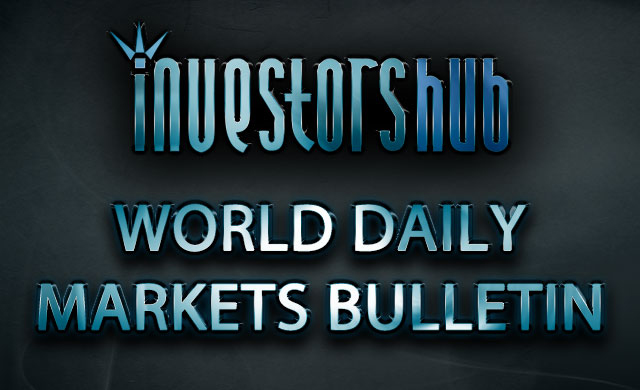Traders May Take A Breather Following Yesterday’s Rally

US Market
The major U.S. index futures are currently pointing to a roughly flat open on Thursday, with stocks likely to show a lack of direction after surging to record highs in the previous session.
Traders may pause to assess the outlook for the markets following yesterday’s rally, which came as consumer prices rose by less than expected in the month of April.
The data added to recently renewed optimism about the Federal Reserve cutting interest rates in the coming months.
Potentially adding to the interest rate optimism, the Labor Department released a report this morning showing a pullback by initial jobless claims in the week ended May 11th.
The Labor Department said initial jobless claims slid to 222,000, a decrease of 10,000 from the previous week’s revised level of 232,000.
Economists had expected jobless claims to fall to 220,000 from the 231,000 originally reported for the previous week.
However, the positive sentiment may be partly offset by a separate Labor Department report showing U.S. import prices jumped by much more than expected in the month of April.
The report said import prices shot up by 0.9 percent in April after climbing by an upwardly revised 0.6 percent in March.
Economists had expected import prices to rise by 0.3 percent compared to the 0.4 percent increase originally reported for the previous month.
The annual rate of growth by import prices accelerated to 1.1 percent in April from 0.4 percent in March, reflecting the largest over-the-year increase since December 2022.
The Labor Department also said export prices climbed by 0.5 percent after inching up by a downwardly revised 0.1 percent in March.
Economists had expected export prices to climb by 0.4 percent compared to the 0.3 percent rise originally reported for the previous month.
Compared to the same month a year ago, export prices fell by 1.0 percent in April after tumbling by 1.4 percent in March.
With traders reacting positively to closely watched consumer price inflation data, stocks moved sharply higher during trading on Wednesday. The major averages added to Tuesday’s gains, setting new record closing highs.
The major averages saw further upside late in the session, reaching new highs for the day. The tech-heavy Nasdaq surged 231.21 points or 1.4 percent to 16,742.39, the S&P 500 shot up 61.47 points or 1.2 percent to 5,308.15 and the Dow jumped 349.89 points or 0.9 percent to 39,908.00.
The rally on Wall Street came following the release of a Labor Department report showing consumer prices in the U.S. rose by slightly less than expected in the month of April.
The Labor Department said its consumer price index increased by 0.3 percent in April after rising by 0.4 percent in March. Economists had expected consumer prices to climb by another 0.4 percent.
Excluding food and energy prices, core consumer prices still rose by 0.3 percent in April after climbing by 0.4 percent in March. The increase in core prices matched economist estimates.
The report also said the annual rate of consumer price growth slowed to 3.4 percent in April from 3.5 percent in March, in line with expectations.
The annual rate of core consumer price growth decelerated to 3.6 percent in April from 3.8 percent in March. The slowdown also matched estimates.
Following yesterday’s hotter-than-expected producer price inflation data, the report added to recently renewed optimism about the outlook for interest rates.
“The CPI print offered a modicum of hope that inflation is cooling, albeit slowly,” said Quincy Krosby, Chief Global Strategist for LPL Financial.
She added, “The Fed will certainly need a series of cooler reports for adjusting its rate easing timetable, but the CPI report suggests that the path towards 2% is a bit less bumpy.”
Meanwhile, the Commerce Department released a separate report showing retail sales in the U.S. unexpectedly came in flat in the month of April.
The Commerce Department said retail sales were virtually unchanged in April after climbing by a downwardly revised 0.6 percent in March.
Economists had expected retail sales to rise by 0.4 percent compared to the 0.7 percent increase originally reported for the previous month.
Excluding sales by motor vehicle and parts dealers, retail sales edged up by 0.2 percent in April after jumping by 0.9 percent in March. The uptick matched economist estimates.
Computer hardware stocks saw substantial strength on the day, driving the NYSE Arca Computer Hardware Index up by 4.1 percent to a record closing high.
Shares of Dell (NYSE:DELL) soared after Morgan Stanley raised its price target on the computer maker’s stock to $152 from $128, calling it the “best way to play” the AI infrastructure build-out.
Significant strength was also visible among housing stocks, as reflected by the 3.4 percent surge by the Philadelphia Housing Sector Index.
The index reached its best closing level in over a month even though a report from the National Association of Home Builders showed an unexpected slump by homebuilder confidence in May.
Semiconductor stocks also moved sharply higher over the course of the session, with the Philadelphia Semiconductor Index jumping by 2.9 percent to a two-month closing high.
Software, brokerage and commercial real estate stocks also saw considerable strength, while airline stocks were among the few groups that bucked the uptrend.
U.S. Economic Reports
A report released by the Labor Department on Thursday showed first-time claims for U.S. unemployment benefits fell roughly in line with estimates in the week ended May 11th.
The Labor Department said initial jobless claims slid to 222,000, a decrease of 10,000 from the previous week’s revised level of 232,000.
Economists had expected jobless claims to fall to 220,000 from the 231,000 originally reported for the previous week.
Meanwhile, the report said the less volatile four-week moving average rose to 217,750, an increase of 2,500 from the previous week’s revised average of 215,250.
The Labor Department also released a report on Thursday showing U.S. import prices jumped by much more than expected in the month of April.
The report said import prices shot up by 0.9 percent in April after climbing by an upwardly revised 0.6 percent in March.
Economists had expected import prices to rise by 0.3 percent compared to the 0.4 percent increase originally reported for the previous month.
The annual rate of growth by import prices accelerated to 1.1 percent in April from 0.4 percent in March, reflecting the largest over-the-year increase since December 2022.
The Labor Department also said export prices climbed by 0.5 percent after inching up by a downwardly revised 0.1 percent in March.
Economists had expected export prices to climb by 0.4 percent compared to the 0.3 percent rise originally reported for the previous month.
Compared to the same month a year ago, export prices fell by 1.0 percent in April after tumbling by 1.4 percent in March.
New residential construction in the U.S. rebounded in the month of April, according to a report released by the Commerce Department on Thursday, although the increase fell short of economist estimates.
The report said housing starts surged by 5.7 percent to an annual rate of 1.360 million in April after plummeting by 16.8 percent to a revised rate of 1.287 million in March.
Economists had expected housing starts to spike by 7.5 percent to an annual rate of 1.420 million from the 1.321 million originally reported for the previous month.
Meanwhile, the Commerce Department said building permits tumbled by 3.0 percent to an annual rate of 1.440 million in April after plunging by 5.0 percent to a revised rate of 1.485 million in March.
Building permits, an indicator of future housing demand, were expected to jump by 1.5 percent to an annual rate of 1.480 million from the 1.458 million originally reported for the previous month.
Philadelphia-area manufacturing activity saw a notable slowdown in the pace of growth in the month of May, according to a report released by the Federal Reserve Bank of Philadelphia on Thursday.
The Philly Fed said its diffusion index for current general activity tumbled to 4.5 in May from 15.5 in April, although a positive reading still indicates growth. Economists had expected the index to decrease to 8.0.
Looking ahead, the Philly Fed said firms continue to expect growth over the next six months.
At 9:15 am ET, the Federal Reserve is scheduled to release its report on industrial production in the month of April. Industrial production is expected to inch up by 0.1 percent in April after climbing by 0.4 percent in March.
Federal Reserve Vice Chair for Supervision Michael Barr is due to testify before a Senate Banking Committee hearing on oversight of financial regulators at 10 am ET.
Also at 10 am ET, Richmond Federal Reserve President Thomas Barkin is scheduled to be interviewed live on CNBC.
Philadelphia Federal Reserve President Patrick Harker is due to speak on “The Economic Impact of Higher Education and Healthcare Institutions” and participate in a conversation before the 2024 Anchor Economy Conference at 10:30 am ET.
At 11 am ET, the Treasury Department is scheduled to announce the details of this month’s auction of twenty-year bonds.
Cleveland Federal Reserve President Loretta Mester is due to speak on the economic outlook before the Wayne Economic Development Council Briefings for Business event at 12 pm ET.
At 3:50 pm ET, Atlanta Federal Reserve President Raphael Bostic is scheduled to speak on the economic outlook in a moderated conversation hosted by the Jacksonville Business Journal.
Europe
European stocks are subdued on Thursday as softer U.S. consumer inflation data brought Fed rate cuts back into focus.
The dollar was on the back foot and U.S Treasury yields sank to six-week troughs as investors awaited comments from Federal Reserve officials for additional clues on the rate outlook.
Closer to home, the European Central Bank is widely expected to start cutting interest rates from a record high in June, with economists expecting up to three rate cuts this year.
While the U.K.’s FTSE 100 Index is up by 0.1 percent, the French CAC 40 Index and the German DAX Index are both down by 0.4 percent.
Eni shares have fallen. The Italian Economy Ministry, the Ministero dell’Economia e delle Finanze or MEF, announced the sale of approximately 2.8 percent of the share capital of the energy major for a total amount equal to around 1.4 billion euros.
Low-cost airline easyJet has also slumped after posting a slightly larger than expected pre-tax loss of £350 million ($443 million) for the first half of the year.
Software company Sage Group has also shown a substantial move to the downside despite reporting a robust first-half performance.
Germany’s Siemens has also moved sharply lower after the company posted a drop in its second-quarter earnings at its industrial business.
Deutsche Telekom shares have also slid. The telecom major reported that its first-quarter net profit plunged 87.1 percent to 1.98 billion euros from last year’s 15.36 billion euros.
Meanwhile, Reinsurance company Swiss Re has rallied and Zurich Insurance jumped 2 percent following upbeat first-quarter earnings.
Telecom company BT has also spiked after the new boss of the company set out a path to more than double free cash flow over the next five years.
Future Plc shares have also soared. The publishing company announced a share buyback program of up to 45 million pounds ($57.1 million) after reporting a return to growth in the past quarter.
Asia
Asian stocks rallied on Thursday after Wall Street’s three major indexes notched record closes overnight on optimism that inflation is heading back in the right direction and that there will be two interest rate cuts by the U.S. Federal Reserve in 2024.
Gold was little changed in Asian trading after climbing by 1 percent on Wednesday, aided by a drop in the dollar index and U.S. bond yields. Oil extended gains from the previous session after data showed a larger-than-expected drawdown in U.S. crude inventories.
China’s Shanghai Composite Index finished marginally higher at 3,122.40. Shares of property developers jumped after reports of government plans to buy unsold homes.
Hong Kong’s Hang Seng Index surged 1.6 percent to 19,376.53 as trading resumed after a holiday on Wednesday.
Japanese markets climbed as weak GDP data for the January-March quarter raised fresh doubts about the timing of BOJ rate hikes.
Data from the Cabinet Office revealed that Japan’s preliminary GDP shrank at a 2 percent annual rate in the first quarter, faster than the 1.5 percent drop forecast by economists.
The Nikkei 225 Index jumped 1.4 percent to 38,920.26, while the broader Topix Index closed 0.2 percent higher at 2,737.54.
Seoul stocks rose notably, with the Kospi climbing 0.8 percent to 2,753 on hopes for the Federal Reserve’s possible rate cut.
Australian and New Zealand markets posted strong gains as government bonds rallied, pushing yields lower across the curve.
Australia’s benchmark S&P ASX 200 Index shot up 1.7 percent to 7,881.30, logging its best single-day gain since December 14. The broader All Ordinaries Index added 1.6 percent to close at 8,150.10, led by mining, banks and real estate stocks.
The Australian dollar snapped its three-day winning streak after data showed unemployment climbed more than expected last month, easing pressure on the Reserve Bank of Australia to hike rates again. The mixed jobs report also lifted expectations for rate cuts early next year.
Across the Tasman, New Zealand’s benchmark S&P NZX-50 Index jumped 1.8 percent to 11,728.06.
Commodities
Crude oil futures are rising $0.49 to $79.12 a barrel after climbing $0.61 to $78.63 a barrel on Wednesday. Meanwhile, after surging $35 to $2,394.90 an ounce in the previous session, gold futures are falling $9.70 to $2,385.20 an ounce.
On the currency front, the U.S. dollar is trading at 155.20 yen versus the 154.88 yen it fetched at the close of New York trading on Wednesday. Against the euro, the dollar is valued at $1.0861 compared to yesterday’s $1.0884.







